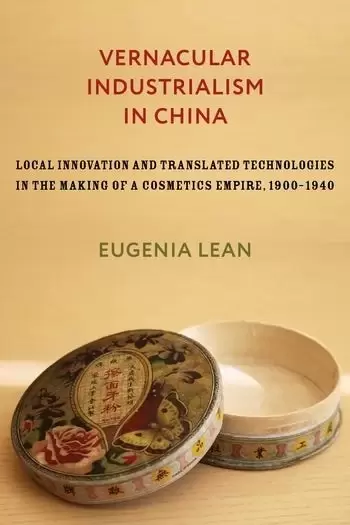
作者:EugeniaLean
出版社:ColumbiaUniversityPress
副标题:LocalInnovationandTranslatedTechnologiesintheMakingofaCosmeticsEmpire,1900-1940
出版年:2020-3-17
页数:416
定价:USD65.00
装帧:Hardcover
丛书:StudiesoftheWeatherheadEastAsianInstitute
ISBN:9780231193481
内容简介
······
In early twentieth-century China, Chen Diexian (1879–1940) was a maverick entrepreneur—at once a prolific man of letters and captain of industry, a magazine editor and cosmetics magnate. He tinkered with chemistry in his private studio, used local cuttlefish to source magnesium carbonate, and published manufacturing tips in how-to columns. In a rapidly changing society, Chen copied foreign technologies and translated manufacturing processes from abroad to produce adaptations of global commodities that outcompeted foreign brands. Engaging in the worlds of journalism, industry, and commerce, he drew on literati practices associated with late-imperial elites, but deployed them in novel ways within a culture of educated tinkering that generated industrial innovation.
Through the lens of Chen’s career, Eugenia Lean explores how unlikely individuals devised unconventional, homegrown approaches to industry and science in early twentieth-century China. She contends that Chen’s activities exemplify “vernacular industrialism,” the pursuit of industry and science outside of conventional venues, often involving ad hoc forms of knowledge and material work. Lean shows how vernacular industrialists accessed worldwide circuits of law and science and experimented with local and global processes of manufacturing to navigate, innovate, and compete in global capitalism. In doing so, they presaged the approach that has helped fuel China’s economic ascent in the twenty-first century. Moving away from conventional narratives that depict China as belatedly borrowing from Western technology, Vernacular Industrialism in China offers a new understanding of industrialization, going beyond material factors to show the central role of culture and knowledge production in technological and industrial change.
作者简介
······
Eugenia Lean is professor of history and East Asian languages and cultures and current director of the Weatherhead East Asian Institute at Columbia University. She is the author of Public Passions: The Trial of Shi Jianqiao and the Rise of Popular Sympathy in Republican China (2007).
目录
······
Acknowledgments
Introduction
Part I: Gentlemanly Experimentation in Turn-of-the-Century Hangzhou
1. Utility of the Useless
Part II: Manufacturing Knowledge, 1914–1927
2. One Part Cow Fat, Two Parts Soda: Recipes for the Inner Chambers, 1914–1915
3. An Enterprise of Common Knowledge: Fire Extinguishers, 1916–1935
Part III: Manufacturing Objects, 1913–1942
4. Chinese Cuttlefish and Global Circuits: The Association of Household Industries
5. What’s in a Name? From Studio Appellation to Commercial Trademark
6. Compiling the Industrial Modern, 1930–1941
Conclusion
Glossary
Notes
References
Index
评论 ······
极具雄心的一本书
陈蝶仙的故事成为串起整本的主线,很喜欢里面穿插的奇闻逸事,特别是鱼骨做牙粉那段。最后一章有点以史为镜的意味,对现代中国制造业的点评和书名再次呼应。
导论封神。但是主体部分论述略显啰嗦,选用史料较为单薄(大量采用陈蝶仙子女回忆录),且难以让人完全信服。许多无法用材料证明的部分,只能基于他人的二手研究略做推测。关涉的议题很多,但又未能做深入探讨。和作者前一本书的观感相似。
ambitious intro – a combination of the cultural turn and the material turn in history of science. Thin and problematic primary sources but good analysis of them…..
评论前必须登录!
注册